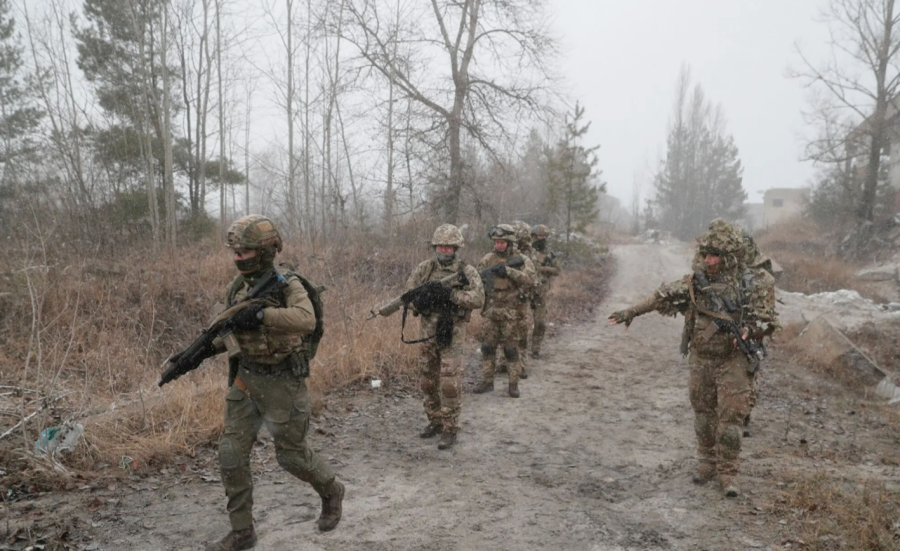Putin Wants To Bring Ukraine “Back Under Moscow’s Influence”
March 1, 2022
Russia’s 100,000 troops positioned along Ukraine’s border have the rest of the world asking the question: what will Vladimir Putin do next? Recently, he issued multiple security demands that were rejected by the West, establishing a diplomatic stalemate.
President Biden described Russia’s potential invasion as what could be “the most consequential thing that’s happened in the world, in terms of war and peace, since World War II.” It is apparent that Putin wants to get something out of this standoff, but it is not clear what that goal is or how he might achieve it.
Examining the historical relationship between Russia and Ukraine helps to understand the politics behind this issue. Both countries were united under the communist Soviet Union in the early 20th century, and as a result there are many familial ties and languages that remain intermingled today. Their alliance after the dissolution of the USSR in 1991 has weakened ever since Kyiv, the capital of Ukraine, began striving for greater inclusivity with its European neighbors. In 2014, the relationship came to a head when Ukraine’s pro-Russian government fell and Russia annexed Ukraine’s Crimea peninsula.
Putin believes that Russians and Ukranians are inevitably connected and that they should be thought of as one people. He criticizes Ukraine’s desire to stay as an independent country, naming it an “artificial construct” and says that the breakup of the Soviet Union was “the greatest geopolitical catastrophe of the century.”
One of Putin’s objectives is to restore Russia as a “great power” on the stage of world affairs, particularly considering the build-up of the North Atlantic Treaty Organization (NATO) and the fact that Ukraine is getting cozy with the West. Volodymyr Zelensky, the Ukrainian President, has further irritated Putin by continuing “on a pro-European course” and has done little to end the war with pro-Russian separatists in eastern Ukraine.
The Kremlin wants assurance that NATO will stop encroaching towards Russia and a commitment that Ukraine will be permanently barred from joining NATO. Keir Giles, a senior consulting fellow of the Russia and Eurasia Program at the London-based think tank Chatham House speculates that Russia seeks “the removal of security guarantees for much of Europe.” In this way, Russia will be positioned to dominate the European continent militarily. He adds that Ukraine is an “unfortunate victim and the most convenient place for Putin to mount his demand with menaces.”
A main motivation of Putin’s might be to bolster his campaign and channel his followers’ attention away from domestic problems. His popularity peaked after the annexation of Crimea in 2014 and he may be hoping that the same will happen if he acts in Ukraine. Putin would also be pleased if he accomplished a “policy victory” over the West, as the 2024 presidential election in Russia is just around the corner.
Anne Applebaum, a fellow at the SNF Agora Institute at Johns Hopkins, hypothesizes that Putin “wants to destabilize Ukraine, frighten Ukraine. He wants Ukrainian democracy to fail. He wants the Ukrainian economy to collapse. He wants foreign investors to flee. He wants his neighbors—in Belarus, Kazakhstan, even Poland and Hungary—to doubt whether democracy will ever be viable, in the longer term, in their countries too.” Ultimately, “he wants America itself to fail.”
It is possible that Putin will limit his attack to “local” incursions in the Donbass region in eastern Ukraine or to Ukraine’s portion of the Sea of Azov. An alternative for Putin may be facilitating a regime change in Ukraine, which would be “a far more reliable and less dangerous means of getting what Russia wants than rolling tanks across the border,” said Giles.
Russia’s urge to umbrella Ukraine under its authority is driven by President Putin’s sense of nationalism and patriotism, values that legitimize his power. As the region struggles domestically, the promise of a bigger and better Russia has populist appeal.
There are several courses of action Putin could take to give him the results he desires because, while many people have little interest in politics, most Russians would appreciate the idea of their country standing up to the West. The only option Putin does not have is to do nothing. If he does not act quickly, he will appear weak to the Russian people and to the world.
Instead of launching a full-blown attack in Ukraine that could result in economic sanctions from the United States and countries in Europe, Putin could decide that it is best to continue to flex his muscle in order to intimidate Ukrainians, and work behind the scenes to upset Zelensky, who is not aligned with his long-term plans. At the end of the day it becomes a waiting game, but it should be no surprise if war is the final reality.
Sources:
Talmazan, Yuliya. “Biden Thinks Putin Will Invade Ukraine. Here’s Why The West Is So Worried.” NBC News. Jan. 25, 2022. https://www.nbcnews.com/news/world/putin-russia-ukraine-invasion-nato-biden-rcna13245
Applebaum, Anne. “The Reason Putin Would Risk War.” The Atlantic. 3 Feb. 2022.
https://www.theatlantic.com/ideas/archive/2022/02/putin-ukraine-democracy/621465/


